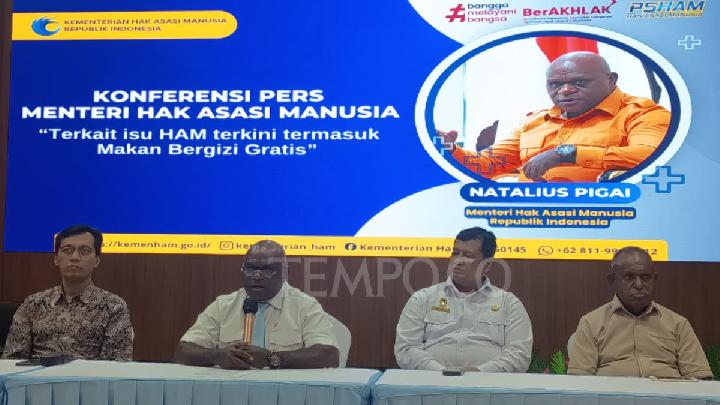By Dian Rahma Fika
Copyright tempo

TEMPO.CO, Jakarta – Indonesian Minister of Human Rights, Natalius Pigai, considers that the mass poisoning cases in the free nutritious meal program (MBG) do not violate the victims’ human rights. According to him, the poisoning cases experienced by thousands of students do not constitute elements of human rights violations.The human rights violations he mentioned are the state’s neglect or intentional allowance of the poisonings. “For example, a school that cooks inadequately, resulting in expired food, cannot be considered a human rights violation,” said Pigai at the Ministry of Human Rights office, Jakarta, on Wednesday, October 1, 2025.Pigai stated that the MBG’s shortcomings originate from management and administrative issues carried out by the Nutrition Fulfillment Service Unit (SPPG). According to him, these two aspects are not within the context of the inherent application of rights to each individual. “Administration and regulation cannot be criminalized,” he said. Furthermore, he mentioned that accountability for administrative and management errors includes corrective actions.Pigai also repeatedly emphasized that poisoning cases resulting from MBG meals are minor findings that do not reflect the success or failure of the program. He mentioned that out of the 30 million MBG beneficiaries, the poisoning cases were 0.00017 percent until September 2025.Pigai concluded that MBG continues to record success. As for the poisoning cases not being considered as human rights violations, he sees it as a procedural error.”It could be due to human error, such as cooking mistakes or inadequate food storage,” he said. During the press conference, Pigai did not use the word ‘poisoning’ to describe what happened in the MBG cases. He referred to it as deviation or aberration.Recently, the MBG program has come under scrutiny due to the increasing number of MBG food poisoning incidents. The Indonesian Education Monitoring Network (JPPI) recorded at least 8,000 people suffering from MBG poisoning. The latest and most widespread case occurred in West Bandung Regency, with 1,309 victims.The Director of the Bandung Legal Aid Institute, Heri Pramono, believes the incident is evidence of the state’s failure to ensure the community’s basic right to safe, healthy food.”The mass poisoning incident caused by MBG in West Bandung is not the first, but a long series of thousands of similar cases in various regions. If the government does not take decisive steps immediately, then this is clearly a violation of human rights,” said Heri in a written statement, quoted on Saturday, September 27, 2025.Despite the binding regulations, the Bandung Legal Aid Institute believes that the state has been negligent in mitigation. For example, Article 64 Paragraph (3) of Health Law Number 17 of 2023 obliges the central and regional governments to ensure that food ingredients meet nutritional and safety standards. Likewise, Article 86 Paragraph (2) of Food Law Number 18 of 2012 regulates the obligation to meet food safety standards, including in government assistance programs.Dinda Shabrina contributed to this articleEditor’s Choice: Indonesia’s BGN Confirms Incentive Scheme for Teachers Overseeing Free MealsClick here to get the latest news updates from Tempo on Google News



